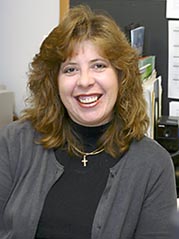

Contents
People

Barney
Spotlight
Name: Trisha Barney.
Position: Administrative assistant in the Department of Molecular Biology. Providing support for the teaching duties and laboratory work of the department chair, Lynn Enquist, and professor Jean Schwarzbauer. Assisting with editorial duties for major scientific journals. Preparing grants, organizing seminar series and assisting with faculty searches and recruitment. Maintaining laboratory and course Web sites.
Quote: ''I love taking advantage of the artistic things that the University has available: the a cappella groups, the student plays, the art museum. The raw talent in the student body is just outstanding.''
Other interests: Attending night school to earn her bachelor's degree. Camping. Spending time with her 9-year-old dog, Tasha, a lhasa-poo.
Briefs
Popular Science magazine has named two Princeton faculty members -- mathematician Maria Chudnovsky and electrical engineer Claire Gmachl -- to its ''Brilliant 10'' list of young scientists.
The annual list consists of ''10 scientists to watch -- people who are gaining recognition from their peers yet remain virtually unknown to the public.'' Chudnovsky and Gmachl were featured in the October issue.
Popular Science cited Chudnovsky, a Veblen Research Instructor in Mathematics, for her work in graph theory and combinatorics. Chudnovsky received her Ph.D. from Princeton in 2003 with Professor Paul Seymour as her adviser. The two solved a major, longstanding problem known as the strong perfect graph conjecture, which concerns fundamental properties of any network, such as a phone system, connected by any number of nodes.
''Young mathematicians are called promising if they are expected to become at least half as good in 10 years as Maria is now,'' Vasek Chvatal, a computer science professor at Concordia University, told the magazine.
Gmachl, an associate professor of electrical engineering, came to Princeton in 2003 from Bell Labs, where she pioneered the development of a practical version of a device known as a quantum cascade laser. ''Once perfected, her tiny, ingenious devices ... could be used to detect biological and chemical weapons or to sniff airports for explosives,'' the article noted.
Princeton physicist Nathaniel Fisch has been named one of seven winners of the U.S. Department of Energy's 2004 E.O. Lawrence Award, which honors outstanding contributions in the field of atomic energy.
Fisch is a professor of astrophysical sciences and director of the Program in Plasma Physics. He also serves as associate director for academic affairs at the Princeton Plasma Physics Laboratory.
Fisch was honored in the nuclear technology category for his discovery of ways to use plasma waves to produce electric current. Plasma is a hot, ionized gas that serves as the fuel for nuclear fusion.
Winners of the Lawrence award received a $50,000 prize and were honored at a ceremony in Washington, D.C., on Nov. 8.
President Emeritus Harold T. Shapiro has been named to the U.S. Olympic Committee board of directors.
He is one of four independent directors on the 11-member board, which is chaired by Peter Ueberroth, president of the Los Angeles Olympic Organizing Committee for the 1984 Olympic Games. The volunteer board sets policy and makes financial decisions, including the hiring and firing of top-level staff.
The USOC board of directors was chosen by a four-person nominating and governance committee, which reviewed almost 200 nominations for the four independent director positions on the board, as well as six nominations submitted by the National Governing Body Council and six submitted by the Athletes Advisory Council for four positions (two each) on the board. As stipulated by the Olympic Charter, the U.S. members of the International Olympic Committee are automatically members of the USOC board of directors.
Shapiro, who earned his Ph.D. in economics from Princeton in 1964, retired from the presidency in 2001 and currently is a faculty member in the Department of Economics and the Woodrow Wilson School.
top

